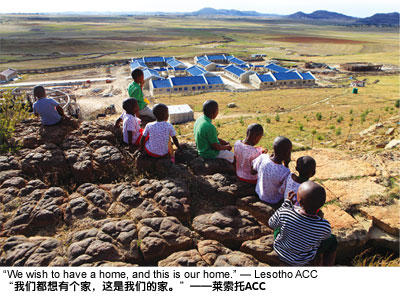 On 30 June last year, 27 young Africans from Amitofo Care Centre’s (ACC) Yuan Tong School in Malawi came to Singapore. They gave a dazzling performance of the Chinese classic Journey to the West: An African Interpretation at the Kallang Theatre. These youngsters were a sight to behold. On the stage, each and every one of them was as spectacular as the King of Monkeys himself. Their display of Chinese martial arts was full of skill and vigour. What was even more remarkable was their proficiency in Chinese. Not only were they fluent in Chinese, but they were also able to belt out a number of songs in Chinese and other languages that drew spontaneous applause from the whole audience.
On 30 June last year, 27 young Africans from Amitofo Care Centre’s (ACC) Yuan Tong School in Malawi came to Singapore. They gave a dazzling performance of the Chinese classic Journey to the West: An African Interpretation at the Kallang Theatre. These youngsters were a sight to behold. On the stage, each and every one of them was as spectacular as the King of Monkeys himself. Their display of Chinese martial arts was full of skill and vigour. What was even more remarkable was their proficiency in Chinese. Not only were they fluent in Chinese, but they were also able to belt out a number of songs in Chinese and other languages that drew spontaneous applause from the whole audience.
In July of this year, four more students from Yuan Tong came to Singapore to exhibit their talents. These four orphans brought with them the stories of their ambitions and struggles, as they joined students from 28 local schools in ACC’s Love Chinese, Inspire Life — a series of activities designed to showcase the joys of learning the Chinese language.
The Black Pearls of Malawi
Malawi, officially the Republic of Malawi, is a small, landlocked, agricultural country in the South East of Africa. Its inhabitants’ hospitality has earned the country its nickname: The Warm Heart of Africa. The country’s official languages are Chichewa and English which are used equally. Malawi is one of the world’s most economically underdeveloped countries. Its people are generally under-educated, and its per capita income is a mere $230 per annum. The average person lives on 60 cents a day. With the HIV/AIDS virus rife, life expectancy stands at 37, and there are hundreds of wandering orphans on the streets who endure the pain of disease, poverty and social turbulence on a daily basis.
Of the four orphans who came to Singapore this year, two were girls — Wan En and Wan Mu — and two were boys — Ah Om and Ah Min. All four have grown up in Malawi ACC, and attend the Yuan Tong School. As well as their mother tongue they can also speak and write English and Chinese. Their own lives were miraculously changed when they were referred to ACC by their respective local social welfare offices — as this meant an immediate improvement in their living conditions and the promise of a good education.
Setting Up ACC
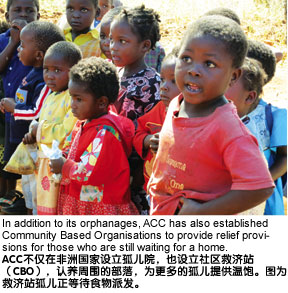 ACC is an international Buddhist charity organisation founded by the Taiwanese Venerable Master Hui Li. So affected was he by the plight of African children that he came up with the ambitious plan to set up orphanages in 54 countries on the continent. In so doing, he hoped to care for as many of the continent’s orphans as possible, and to provide them with a home, an education, a source of hope, and the ability to pursue their dreams. ACC is an international Buddhist charity organisation founded by the Taiwanese Venerable Master Hui Li. So affected was he by the plight of African children that he came up with the ambitious plan to set up orphanages in 54 countries on the continent. In so doing, he hoped to care for as many of the continent’s orphans as possible, and to provide them with a home, an education, a source of hope, and the ability to pursue their dreams.
ACC’s first orphanage was opened in Blantyre, Malawi in 2004, and Lesotho ACC and Swaziland ACC have since followed. But ACC’s mission in Africa goes beyond the support of orphans. It also includes the construction of schools, the delivery of relief provisions, the facilitation of occupational training, and the restoration of traditional African culture.
After nine years of careful management, the Malawi ACC is now home to 285 orphans. At its maximum capacity, it can accommodate around 500. To spread its beneficial influence further, it has also adopted nine tribes in Blantyre and set up a Community Based Organisation (CBO) to provide relief provisions for 2,800 orphans who do not have a home in the orphanage. At the CBO these children are given a meal every day and there is a matron there to look after them. They are also put on a waiting list for ACC, where, if they are lucky, they will eventually receive permanent long-term care and education.
Lesotho and Swaziland are landlocked countries surrounded on all sides by either South Africa or Mozambique. Lesotho is mountainous and has large areas of wilderness. Given its terrain, basic infrastructure is understandably lacking. Consequently, the Lesotho ACC is smaller than Malawi’s. With 125 orphans presently on roll it is running at a 50 per cent occupancy rate. Swaziland ACC has only been operating for a relatively short period of time, and as yet provides a home for only 90 orphans, but despite not having a CBO it sponsors the living costs of 400 more.
Preparations for orphanages are also under way in Zimbabwe, Mozambique, Namibia and South Africa. Among these, construction has already begun in Mozambique and South Africa’s ACC has its ground-breaking ceremony coming up soon.
Compassion is Priceless — Sponsoring African Orphans
In an interview with EduNation, Singapore ACC President Ms Tjeng Yan Hoa told us how her own involvement with the orphans of Africa began.
In December 2008, 21 orphans from Africa gave a series of performances as part of a cultural exchange programme here in Singapore. Aside from being fundraisers for the construction of ACC facilities, these performances were also expressions of gratitude to their many sponsors. Ms Tjeng attended one such performance, and witnessed first-hand how the African children on the stage could not only converse in Mandarin, but could also sing Chinese songs and recite Chinese classics like The Three Character Classic, Standards for being a Good Student and Child, and Tang Dynasty poems. Their Chinese martial arts skills were also quite remarkable. This not only won Ms Tjeng’s admiration, but also her financial support. She was so moved that she made the decision on the spot to sponsor five African orphans’ living expenses.
“In Singapore, a trip to the supermarket can easily set you back by $300,” she said. “The same amount can pay for a tribal orphan’s education and change his or her life.”
An annual donation of $300 is not a large sum for many Singaporeans, so Ms Tjeng decided that she would try and source for as many donations as she could. Her sincerity was contagious, and many of her friends soon donated to the cause as well.
Aiding ACC in Organising Charity Performances
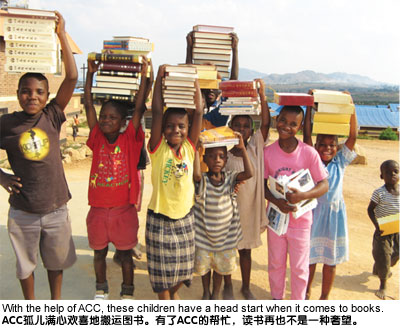 ACC requires substantial financial support in order to maintain its orphanage operations in Africa. The smallest ACC orphanage in Lesotho needs an estimated US$25,000 (S$31,745) a month to survive. With the extra 2,800 orphans under the care of its CBO, the Malawi ACC needs nearly twice that amount. ACC requires substantial financial support in order to maintain its orphanage operations in Africa. The smallest ACC orphanage in Lesotho needs an estimated US$25,000 (S$31,745) a month to survive. With the extra 2,800 orphans under the care of its CBO, the Malawi ACC needs nearly twice that amount.
Other than depending on charitable donations from around the world, ACC also raises funds by sending their children to perform overseas during their school vacations. These performances don’t just help to raise money, they also let the rest of the world witness the problems that Africa faces. The children themselves also benefit from these tours in that they have their horizons broadened and can start to develop a global outlook on things. This in turn means that they can envisage and plan for bigger and brighter futures.
In 2011, Ms Tjeng gave a considerable sum of money to enable orphans from Malawi ACC to perform at the Ang Mo Kio Community Centre and the NTUC Auditorium. Ms Nicolle Tan, the current public relations executive for Singapore ACC, was deeply affected by one of these shows. As a result, she asked two of her friends, Mr Cai Yiren from TCR Music Station and Mr David Lee from Sing Zhi Cultural and Education Development Association, to collaborate with ACC’s volunteer team to help the Lions Club Royal (Singapore) organise two Echoes of Love from Malawi Africa charity performances the following year.
It was after these that the plans for setting up a Singapore ACC were officially put on the agenda. Finding itself with widespread support, Singapore ACC was officially established on 4 November 2012, and Ms Tjeng was appointed its first president.
Providing a Trilingual Education
As far as its curriculum is concerned, ACC follows the education policies of the various countries in which its orphanages can be found, but its schools also teach the Chinese language and the classics of Chinese literature.
In an average week there will be four periods of Chinese Language class, though several of the available extra-curricular activities provide additional opportunities for the students to familiarise themselves with the language — these include Chinese martial arts, traditional dance, Chinese orchestra and choir. Sometimes, students get to stay for short periods with their teachers from China or Taiwan. At all times, though, the students will use Chinese when they communicate with them. Consequently, they use the language on a daily basis, and as a result they often become impressively proficient in it.
Chinese martial arts are essentially taught to help strengthen the students’ constitution and ward off the threat posed by malaria, whilst Chinese language and culture classes provide the added opportunity for the children to engage with an alternative experience and outlook on life. Through ACC’s education framework, young Africans are therefore not only equipped with traditional African wisdom, but are also fortified with Chinese ethics, values and etiquette. Together these form the base upon which they can build a brighter future for themselves.
ACC Students Dazzle on the International Stage
Administering Chinese education to African children with no prior contact with Chinese language or culture is no easy task. Indeed, when the children first started their Chinese lessons, they often dozed off in class, and needed interpreters to assist them from the side.
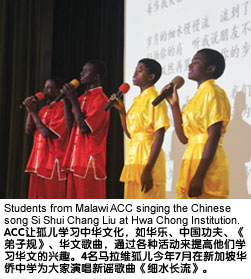 After time and dedication however, the students of ACC can now show just what they are capable of on the international stage. In 2011, Ms Wang Yan Lin, a Chinese tutor from the National Office for Teaching Chinese as a Foreign Language (NOTCFL) in Malawi ACC, selected and trained three students to take part in the fourth Chinese Proficiency Competition for Foreign Secondary School Students. The Malawi ACC students first won the African regional preliminary round, and then went on to clinch the Group Category 3rd Prize, and a Best Individual Performance Award in the Grand Finals. After time and dedication however, the students of ACC can now show just what they are capable of on the international stage. In 2011, Ms Wang Yan Lin, a Chinese tutor from the National Office for Teaching Chinese as a Foreign Language (NOTCFL) in Malawi ACC, selected and trained three students to take part in the fourth Chinese Proficiency Competition for Foreign Secondary School Students. The Malawi ACC students first won the African regional preliminary round, and then went on to clinch the Group Category 3rd Prize, and a Best Individual Performance Award in the Grand Finals.
Ah Om, Wan Xiang and Wan En got even more out of this competition as their performance earned them a scholarship from the Confucius Institute to study for six months at the Dalian University of Foreign Languages in China. The time in Dalian was well spent. “I made a number of friends from all around the world at Dalian University,” said Ah Om. “We all took care of each other and bonded like siblings. What made me the happiest over there was the football team. I could play football every single day.” And Wan En felt that the need to communicate with people from all around the globe significantly elevated her proficiency in Chinese.
We All Have Dreams, Let Them Take Flight
Because they no longer need to worry about where their next meal is coming from, and because they receive such a good education, ACC children can look forward to a better future in a larger, broader world. And Wan En, Wan Mu, Ah Om and Ah Min are all holding on to dreams about their own future.
Wan Mu’s dream is to become a doctor. “Malawi suffers from a serious lack of doctors,” she said. “People have to wait for such a long time for treatment. This is why I want to become a doctor. My dream is to help all these people.” Wan En and Wan Mu have the same career aspirations. Both of them want to alleviate the pain that the sick are currently forced to suffer.
Out of the four children, Ah Om is the oldest. His dream is to become a pilot. “When I was younger I never had a chance to actually see an airplane,” he said. “That is why I was very curious when I saw one in the movies. Someone told me afterwards that the machine was an aeroplane, and that it can travel across the sky. After entering ACC, I was chosen for a performance in Taiwan. When we boarded the airplane, the captain came to talk to us. He showed us the cockpit, and even explained to us how the airplane worked, and how it should be operated. From then on, I set my sights on being a pilot.”
His dream goes a little further still. After becoming a pilot, he wants to do something else — build airports in Malawi. “In the future, if I am able to, I want to help Malawi build splendid airports,” he said. “Malawi only has one airline company. Very few people ever get on a plane. Tickets are also very expensive. I want to change that. I want to make air travel affordable for Malawians. And I want more of them to be able to take planes. This is also my dream.”
But Ah Min has a dream that is far more ambitious: he wishes to become the President. “I want to become the President of Malawi, and transform it into a strong and prosperous country,” he said. “Malawians are very good-hearted, but they have no love for learning. When I become the President, I want to change this situation. It is only through learning that people can change their lives and escape poverty.” When he grows up, he also wants to reach out to other orphans, and give them the opportunity for education, and the means to mould their own future.
Forever ACC’s Children
All four orphans hope to go to university after completing their senior year in high school and major in subjects that will bring them closer to realising their dreams.
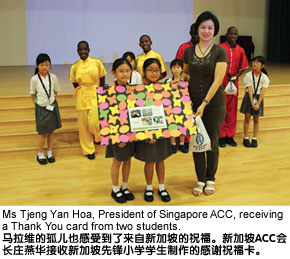 Malawi law dictates that once an orphan reaches the age of 18, he or she needs to move out to make space for the younger children. Even in Singapore, 18-year-olds rarely have the means to support themselves, but these orphans have to face much more austere trials at this age. Fortunately, though, ACC will provide full support for any of their orphans who manage to pass the university entrance examinations. ACC also takes into consideration those who aren’t so academically inclined. It will assign these students to vocational training courses so that they can pick up the skill sets they will need to make a living. Malawi law dictates that once an orphan reaches the age of 18, he or she needs to move out to make space for the younger children. Even in Singapore, 18-year-olds rarely have the means to support themselves, but these orphans have to face much more austere trials at this age. Fortunately, though, ACC will provide full support for any of their orphans who manage to pass the university entrance examinations. ACC also takes into consideration those who aren’t so academically inclined. It will assign these students to vocational training courses so that they can pick up the skill sets they will need to make a living.
In recent years, there has been a lot of Chinese and Taiwanese investment in Malawi. ACC’s batch of Malawi students who are well-educated in Chinese, English and Chichewa will make up a much needed talent pool from which these companies can recruit. In terms of making a living, these students should be well set. However, if any of them wish to return to work for ACC, they will be welcomed with open arms. Even though they may have long since left school, they are still and will always be children of ACC.
“ACC’s care, as well as the sponsors’ support, has given the orphans of Malawi a glimpse of hope,” said Ms Tjeng. “In providing them with assistance, I have also gained valuable experiences. ACC hopes that more philanthropic individuals will participate in this sponsorship project and give these children a home and a source of hope so that they can grasp and shape their own future.”
Translated By: Kwan Cheurn Hsi
|